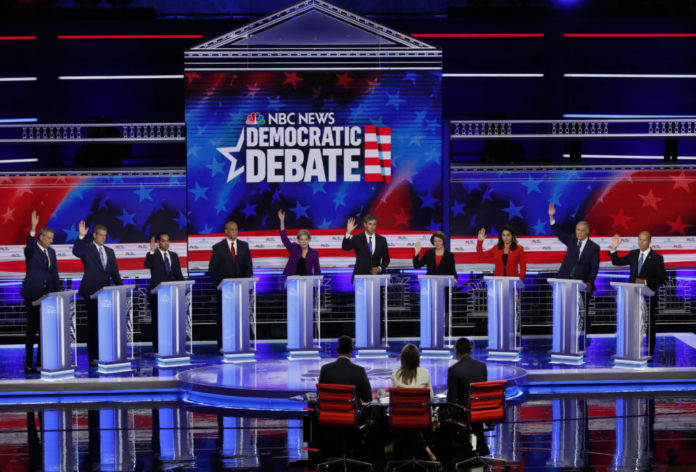
Nights one and two of the Democratic debates are over and we have a clear understanding of where the Democratic Party platform lies. From Elizabeth Warren advocating for zero restrictions on abortion to every single candidate on night two pledging to give illegal immigrants healthcare, it’s clear that any shred of moderation is not welcome on the Democratic ticket.
What America witnessed in the first round of the Democratic debates is a massive shift in ideals from the last two national election cycles. In 2008, then presidential hopeful Barack Obama was the most progressive candidate the people of the United States have ever seen– advocating for a government run healthcare plan and going on an apologetics tour on behalf of America’s supposed injustices. The Democratic Party officially reached full-scale, far left progressivism after 8 years of the Obama administration. Or so we thought.
In 2016, we saw a new wave of progressivism in the form of Bernie Sanders. Even the DNC couldn’t handle the radical thought of so-called democratic socialism. Fast forward to 2019 and Sanders is struggling to bring ideas that allow him to stand apart from the rest of the presidential contenders. Feasible policy solutions are not only no longer a forethought, they’re not even an afterthought. President Obama at least knew the unrealistic implementation of universal healthcare and went for a public option (which was still a failure), but now kicking 180 million Americans off of their private health insurance is a mainstream talking point.
But the Democratic candidates felt the need to take it one step further. Every single Democrat on the stage of the second night of debates raised their hand when asked if their healthcare plan would cover illegal aliens. Not only will everyone have to involuntarily pay into government run health insurance, but everyone will have to pay for health insurance for immigrants who entered this country illegally.
It didn’t stop there. Along with footing the bill for illegal immigrants, abortion coverage was also an uncontested consensus among the candidates. When prompted if there should be any restrictions on abortion, media favorite Elizabeth Warren refused to corroborate such an idea, simply answering that every woman should have access to unfettered “reproductive healthcare.” Many on the stage echoed the same sentiment. Does this zero-restriction abortion access fare well with the American people? Not even close. Only 18% of Americans support this stance, as reported by NPR.
Of course, our nation’s southern border was another hot topic issue that largely saw unanimity among the debaters. The actions proposed for immigration and border security policy included executive orders to streamline citizenship for illegals, putting an end to the Obama era policy of child separations (meaning children will therefore be jailed with their parents instead of detained and released), and even eradicating the criminal code that makes crossing the border between ports of entry illegal.
No restriction abortions, abolishing private insurance, healthcare coverage for illegal immigrants, and decriminalizing border crossings; do these positions reflect the views of the average Democratic voter? Or, despite the mainstream Democratic base calling on these ideals, are these still considered fringe policies? The answer is, it doesn’t matter. It doesn’t matter because these suggested solutions are what the platform is offering the American people regardless of potential disconnect from its base.
Data from Pew Research confirms that while Republicans have only slightly shifted in their ideals in the past 23 years, center Democrats have shifted drastically left. The identity of the Democratic Party is at the whims of the leftist progressive agenda. The 2020 election will be a referendum on what direction the average Democrat wants their party to go in. What used to be considered fringe ideas is no longer the outlier of the platform, it is the platform. Democratic voters need to ask themselves how much they still relate to the leaders of their own party because history has shown, once you go radical it’s nearly impossible to go back.
Alyssa Ahlgren
Alyssa has her Bachelor’s in Business Administration and currently works as an analyst in corporate finance. She grew up in northern Wisconsin and is a former collegiate hockey player. Alyssa is pursuing her passion for current events and politics through writing and being an advocate for the conservative movement.
















